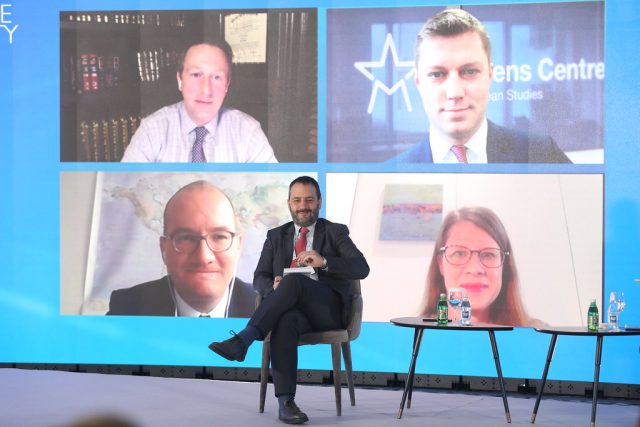 The Center for Accountable Investment (CAI) uses the CIPE developed lens of Corrosive and Constructive Capital to understand the impact of investment on market and democratic institutions in recipient countries. CAI collects and refines tools and methodologies that can be implemented within CIPE’s project portfolio and a hub to share successful approaches and knowledge.
The Center for Accountable Investment (CAI) uses the CIPE developed lens of Corrosive and Constructive Capital to understand the impact of investment on market and democratic institutions in recipient countries. CAI collects and refines tools and methodologies that can be implemented within CIPE’s project portfolio and a hub to share successful approaches and knowledge.
CIPE’s work with business associations and think tanks from around the world has always given the organization a unique perspective, and with CAI the organization is bringing that knowledge and experience to the global democracy community. CIPE’s full body of work with partners on the topic can be viewed on the Corrosive and Constructive Capital Initiative webpage. Key points and related posts are below.
CAI’s work is offensive and defensive:
- Reducing Corrosive Capital (Defensive) – a strategy which incorporates a strong voice of the private sector in reducing governance gaps and increasing transparency and accountability at the government
level. - Increasing Constructive Capital (Offensive) – a strategy that works with the private sector on initiatives ranging from collective action against corruption, incorporating self-regulatory mechanisms,
and introducing supply chain reorientation, among other programs.
Constructive and Corrosive Capital
Corrosive Capital
- DEFINITION: Corrosive Capital is financing, whether state or private, that lacks transparency, accountability, and market orientation.
- PROBLEM: Originating from authoritarian regimes, Corrosive Capital exploits and exaggerates governance gaps to influence economic, political, and social developments in recipient countries.
- SOLUTION: Increase transparency and accountability around investment to neutralize the effects of Corrosive Capital.
Constructive Capital
- DEFINITION: Constructive Capital refers to financial flows that are well-governed at the funding source and destination and respond to market voids.
- INDICATORS: Transparent terms and entry into the market, accountable to a wide array of local stakeholders in the recipient country, and justification is based on market principles
- BENEFITS: Benefits of Constructive Capital investments include transparent and documented terms, stakeholder accountability, and more.
Why “Accountable Investment”?

Over the past several decades responsible investment has come to be defined by the financial industry as an approach to investment that incorporates environmental, social, and governance factors, as well as the long-term stability and sustainability of a particular market segment. Accountable investment takes a different approach. While responsibility can be shared accountability cannot. In the case of environmental, governance, or labor standards beyond the legal requirement of the locality, a shared responsibility by firms can be avoided by those seeking to be unaccountable, creating a race to the bottom, increasing corruption and reducing citizen’s faith in both markets and democracy.
Accountability at the firm level is an acceptance of responsibility for honest and ethical conduct towards others, it is the acceptance of responsibility for the firm’s own actions. At the collective level, these are firms that take action to create a better enabling environment to create more opportunity and value for all citizens.
Eric Hontz, CAI Director
 Eric Hontz leads CIPE’s work on Corrosive Capital and is actively developing CIPE’s thought leadership on Constructive Capital; initiatives that sit at the confluence of corporate governance, anti-corruption compliance, the rule of law, and the business and investment climate, with patterns of trade and investment worldwide. Hontz is active in developing the capacity of business organizations in the Europe and Eurasia region to advocate on behalf of member interests and helping these organizations to foster a culture of business growth. In prior roles, Hontz was an associate at a law firm and a vice president at an investment bank, where he reviewed complex alternative investment products. He is frequently featured in media as an expert on economic reform and policy in Ukraine and other former Soviet states.
Eric Hontz leads CIPE’s work on Corrosive Capital and is actively developing CIPE’s thought leadership on Constructive Capital; initiatives that sit at the confluence of corporate governance, anti-corruption compliance, the rule of law, and the business and investment climate, with patterns of trade and investment worldwide. Hontz is active in developing the capacity of business organizations in the Europe and Eurasia region to advocate on behalf of member interests and helping these organizations to foster a culture of business growth. In prior roles, Hontz was an associate at a law firm and a vice president at an investment bank, where he reviewed complex alternative investment products. He is frequently featured in media as an expert on economic reform and policy in Ukraine and other former Soviet states.







